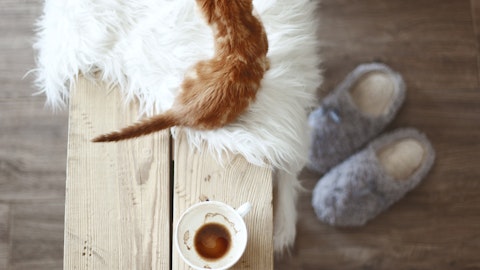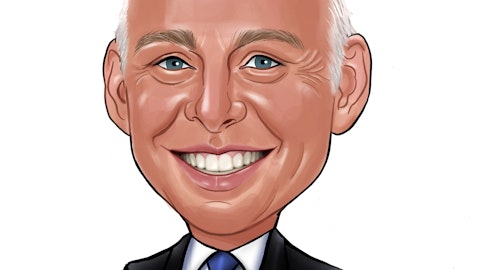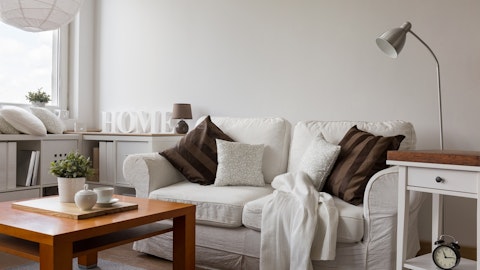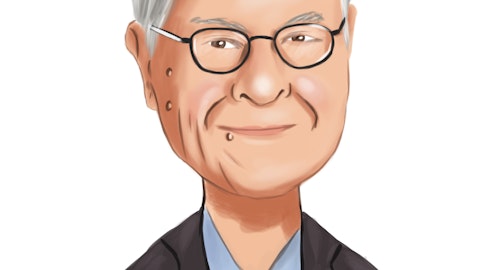Hooker Furnishings Corporation (NASDAQ:HOFT) Q1 2024 Earnings Call Transcript June 8, 2023
Hooker Furnishings Corporation beats earnings expectations. Reported EPS is $0.13, expectations were $0.11.
Operator: Ladies and gentlemen, thank you for standing by. Welcome to the Hooker Furnishings Corporation’s First Quarter 2024 Earnings Webcast. At this time, all participants are in a listen-only mode. After the speakers’ presentation, there will be a question-and-answer session. [Operator Instructions] Please be advised that today’s conference is being recorded. I would now hand the conference over to your speaker host, Mr. Paul Huckfeldt, Chief Financial Officer. Please go ahead sir.
Paul Huckfeldt: Thank you, Lydia. Good morning and welcome to our quarterly conference call to review financial results for the fiscal 2024 first quarter, which ended on April 30th, 2023. Joining me this morning is Jeremy Hoff, our Chief Executive Officer. We appreciate your participation this morning. During our call, we may make forward-looking statements, which are subject to risks and uncertainties. A discussion of factors that could cause our actual results to differ materially from management’s expectations is contained in our press release and SEC filing announcing our fiscal 2024 first quarter results. Any forward-looking statement speaks only as of today and we undertake no obligation to update or revise any forward-looking statements to reflect events or circumstances after today’s call.
This morning we reported consolidated net sales for the fiscal 2024 first quarter of $121.8 million, a decrease of $25.5 million or 17% compared to last year’s first quarter. The revenue decline was driven by $20 million sales decrease in the Home Meridian segment due to lower sales of major furniture chains and mass merchants and to a lesser extent, a 15% decrease in domestic upholstery after two years of sales growth in this segment. Net sales in the Hooker branded segment remained relatively flat compared to the prior year. Consolidated net income was $1.5 million or $0.13 per diluted share this quarter compared to $3.2 million or $0.26 per diluted share in the prior year period. Now, I’ll turn the call over to Jeremy to comment on our fiscal 2024 first quarter results.
Jeremy Hoff: Thank you, Paul and good morning everyone. On our call today, we’ll discuss our quarterly results and several of our long-term strategic initiatives which are positioned to begin delivering organic growth considering the softer retail environment, economic uncertainties, and our recent exit from the Accentrics Home line, we’re pleased to have exceeded external expectations for sales and earnings during the quarter. Our liquidation of ACH inventories and other obsolete inventories at HMI is about 80% complete, which is helping us reduce our domestic warehousing footprint and make progress towards getting profitability back on track at HMI. This quarter, we were able to strengthen our balance sheet. We generated about $22 million in cash from operating activities, which contributed to a $12 million increase in our cash position for the quarter and funded $4.3 million share repurchases along with our typical cash requirements.
As we moved into May and now June, we are continuing to build cash and further reduce inventories. As of yesterday, we have generated almost $16 million more in cash since the end of our first quarter, bringing our cash balance to $46 million. Inventory levels decreased by $23 million during the quarter, well on our way towards our goal of reducing inventories by $30 million before fiscal year end. Our new Hooker Legacy Showroom grand opening in its April High Point Market met our expectations as we nearly doubled our attendance from a year ago, attracting new customers and providing a much more meaningful presentation of our legacy brands and the launch of our new brand M. Many of our strategic organic growth initiatives that will enable us to increase our share of total addressable market and visibility are tied to the new showroom and Hooker Legacy brands.
One of those strategic growth initiatives, the High Point Market launch of M domestically produced upholstery and imported occasional furniture brand surpassed our expectations. This new brand combining the unique capabilities of HF Custom Shenandoah, Bradington-Young, and Hooker Casegoods will enable us to compete in a modern lifestyle aesthetic without disrupting any of those core businesses. Retailers affirm to us that the new M brand is very much on point with the up and coming casual modern lifestyle that today’s younger consumer is gravitating towards. The rebranding of Sam Moore to HF Custom at the Spring High Point Market came at an ideal time as the timing allowed us elevate the look of the product with new covered treatments in silhouettes and unveil the brand within a highly updated presentation in Showplace.

WorldWide/Shutterstock.com
Just prior to the April High Point Market, we completed the transition to a new ERP system for our outdoor furnishings line Sunset West. In addition, we completed our positioning of the brand for East Coast distribution by stocking the line both in its current West Coast warehouse and now adding Sunset West inventory to our East Coast Savannah warehouse. At the Spring High Point Market, Sunset West debuted its first comprehensive display in our industry’s major East Coast market. We believe that Sunset West’s expansion to a national distribution offers a double-digit organic growth opportunity over multiple years. Also in April, we announced Hooker Furnishing and leading lifestyle and entertainment company, Scott Brothers Global have renewed the multiyear licensing agreement, which HMI’s Pulaski and Samuel Lawrence Furniture divisions serve as the exclusive bedroom, dining, and occasional furniture suppliers for the Drew and Jonathan Home brand.
At the High Point Market, HMI introduced a 26-piece Drew and Jonathan collection in a California Casual to further expand the product line. After initial delay due to the pandemic, the Drew and Jonathan Home line now has the retail placements and demand momentum benefiting shipments in the short and long-term. Our transition to a new leaner business model of HMI will continue into this year as we move away from higher risk businesses that focus on our core strength and businesses; Pulaski Furniture, Samuel Lawrence Furniture, Samuel Lawrence Hospitality, and Primary Resources International, we believe are still on track to achieve profitability in segment by the end of the fiscal year. Importantly, the HMI team is focused on our core competencies as we direct our support and resources behind our key businesses, while reducing cost.
Now, I want to turn the discussion over to Paul, who will discuss highlights in each of our segments.
Paul Huckfeldt: Thanks Jeremy. Beginning with our Hooker Branded segment, net sales remained relatively unchanged, decreasing by — slightly by 0.8% or $339,000 compared to the prior year first quarter. Gross profit and gross margin remained relatively flat as well. Net sales were negatively impacted by higher discounting compared to abnormally low levels of discounting in prior year period. While we benefited from price increases implemented in the prior year to mitigate product cost inflation, discounting increased by 230 basis points from the prior year due to somewhat softer demand in the current quarter. Higher demurrage and drayage expenses, which heavily impacted the gross margin in previous quarters, were still higher than prior year first quarter, but are trending down.
At the end of the first quarter, Hooker Branded inventory levels decreased by $14 million compared to the fiscal 2023 year end. Inventories are still elevated at quarter end and are higher than pre-pandemic levels in calendar 2019. So, we continue to work to align our inventory levels with current demand. We’re pleased that our inventory management process is working well, so we’re in stock on most best-selling items and inventory obsolescence has not been an issue. Quarter end backlog for Hooker Branded was lower than the prior year first quarter end, but remained 50% higher than pre-pandemic lows. Incoming orders decreased by about 16% compared to the prior year quarter and approach levels similar to fiscal 2020 first quarter, reflecting more normalized post-pandemic demand.
Turning to the Home Meridian segment, as Jeremy noted, the sales decrease was better than our expectations and the operating loss of $2.1 million was a $1 million improvement compared to the prior year first quarter. Net sales at HMI decreased by $20 million or 32% compared to the prior year first quarter, driven by sales decreases with some major furniture change in mass merchants in a slower retail environment for home furnishing. Other factors contributing to the lower sale include delayed orders from retail customers as they continue to reduce their inventory and the absence of the clause at ACH sales businesses since we’ve exited those divisions. Inventories decreased $9 million from the end of fiscal 2023 due to the liquidation of obsolete inventories and our efforts to align inventory levels with current demand.
On an encouraging note SLH, our hospitality division’s net sales more than doubled compared to the prior year first quarter, indicating a strong recovery in the hospitality industry after the COVID pandemic. Additionally, freight costs have improved due to stabilization of ocean freight rates. Incoming orders and quarter end backlog at HMI were lower than the prior year quarter and fiscal 2020 first quarter due to the absence of orders from the Clubs channel, which HMI exited during fiscal 2022 and the ACH business as well as decreased incoming orders from retail customers. In the domestic upholstery segment, we experienced the first quarterly sales decline in over two years after 10 consecutive quarters of year-over-year sales increases. Sales decreased by $6 million or about 15% compared to prior — to last year’s first quarter.
Sales reductions at HF Custom, Sunset West, and Shenandoah were partially offset by increased net sales at Bradington-Young. Sales decreases at Sunset West are attributed to non-recurring factors, including slowed shipments in February and March caused by the December conversion to our new ERP system and as well as the expansion of the outdoor brands to our East Coast warehouse, which involved transition costs and start-up delays at the Georgia distribution center. These issues were largely resolved by the end of the quarter. We believe that much of the domestic inventory sales dip was driven by the fact that we worked through our large backlogs in these divisions and then experienced somewhat softer demand, which we don’t think is a long-term situation.
Despite the sales decline and disruption, Domestic Upholstery segment reported operating income of $1.3 million and an operating margin of 3.8%. Quarter end backlog for Bradington-Young remained three times higher than pre-pandemic levels at the fiscal 2020 first quarter year end. While backlogs at HF Customs in Shenandoah decreased to levels similar to fiscal 2020. Incoming orders at Bradington-Young and Shenandoah were at similar levels to fiscal 2020, while HF Custom experienced lower orders compared to that period. And while it represents a smaller part of our overall business, all other, which includes our H Contract Senior Living Furniture division, contributed $1.1 million sales increase. Turning now to cash, debt, inventory, and capital allocation.
Cash and cash equivalents stood at $31 million at the end of the fiscal 2024 first quarter, an increase of $12 million from the prior year end. As Jeremy reported earlier, we generated $22 million of cash from operations in the quarter, which we used to fund $4.3 million of share repurchases, $4.5 million of capital expenditures including investments in our new showroom and our new ERP system, and $2.4 million in cash dividend to our shareholders, which helped — and also helped bolster our cash position. We’re pleased with the progress we’ve made reducing inventories, which was a large part of the cash we generated during the quarter. Since the repurchase programs announcement around this time last year, we’ve generated approximately — we returned approximately $20 million to our shareholders and retired just under 1.2 million shares.
And earlier this week, our Board approved an additional $5 million authorization as part of our capital allocation plan for the year. In addition to continuing to execute with the share repurchase plan, our capital allocation priorities for the year included building cash reserves, funding the organic growth initiatives as Jeremy noted earlier, continuing our streak of — 54-year streak of paying of dividends and funding our typical capital expenditure requirements. In addition to our cash balance, we have an aggregate $27.2 million available under our existing revolver at year end to fund other working capital needs should that become necessary. We believe that our liquidity and capital requirements will be further improved through the liquidation sales of the remaining excess HMI inventory.
Now, I’ll turn the discussion back to Jeremy for his outlook.
Jeremy Hoff: Thank you, Paul. While retail conditions remain mixed along with some economic uncertainties, we have begun to see more positive trends for consolidated incoming orders in May and that is holding up so far in June. We believe the industry is getting through some of the elevated inventory challenges and we may be seeing some breakthrough in that area. Following our successful new showroom grand opening at spring High Point Market, Hooker Furnishings will continue initiatives to enhance visibility and addressable market reach this summer, debuting a new showroom at Atlanta market for Hooker Legacy brands. In addition to opening the new showroom for Legacy brands, Sunset West also will debut a new showroom at the Atlanta market, which the new sponsor of the casual market for outdoor furniture relocating from Chicago.
Hooker Legacy brands will show at its fourth Las Vegas market this summer as well. At HMI, we expect the previously announced inventory liquidations to be substantially completed by the end of fiscal 2024 second quarter. While we expect some short-term volatility in sales and earnings at HMI, we continue to expect the segment to achieve quarterly profitability by the end of the 2024 fiscal year. The Hooker Furnishings team continues to focus on organic growth opportunities through expanded visibility, strategic product development, operational improvements, and cost reductions. By focusing on these controllables, we will be in the strongest position possible as the demand environment continues to improve. This ends the formal part of our discussion and at this time, I will turn the call back over to our operator, Lydia for questions.
See also Top 20 Information Technology Countries in the World and Top 20 Countries With The Highest Coffee Consumption.
Q&A Session
Follow Hooker Furnishings Corp (NASDAQ:HOFT)
Follow Hooker Furnishings Corp (NASDAQ:HOFT)
Receive real-time insider trading and news alerts
Operator: Certainly. [Operator Instructions] And our first question coming from the line of Anthony Lebiedzinski with Sidoti. Your line is open.
Anthony Lebiedzinski: Hi, good morning and thank you for taking the questions. So, first, just a couple of questions on the quarter then on your outlook. So, as far as for the quarter, I know you’ll have some of this information in your 10-Q, but can you just first comment on unit volumes versus pricing? I know you guys talked about discounting, so just wondering about just volumes in general versus pricing.
Paul Huckfeldt: I’m going to pull up the — I’m going to pull up our draft of the Q if you if you want to continue another question. Let’s go back to that instead of– here we are.
Anthony Lebiedzinski: Sure. Yes. No problem. Okay. And then, — you got it? Okay.
Paul Huckfeldt: Okay. So, for Hooker, unit volume is down about 6%, but ASP is up about 8%. For HMI, unit volume is down 10% — unit volume is down about 25% ASP is up 13%.
Anthony Lebiedzinski: Got you. Okay.
Paul Huckfeldt: So, we are — increase overall, but, I don’t have a lot..
Anthony Lebiedzinski: Got it. Okay. And then just it was nice to see overall gross margin increase of nearly three percentage points on a consolidated basis. I know you guys talked about the discounting as well as higher demurrage costs, but obviously, we have lower ocean freight costs as well. So, kind of, — can you just talk about the various puts and takes as to what drove the gross margin increase?
Jeremy Hoff: Good morning, Anthony. Really we’re starting to experience cost just continually starting to come down versus what we were experiencing during the pandemic. As far as the discounting line, we’re really getting back to a little more normalized discount line. We went to an unusual very low or almost zero discount line during the pandemic for obvious reasons with all the supply chain challenges and everything that’s going on. And the demand at the level that we saw, there wasn’t — it changed our entire approach and I think the industry’s approach from a discount standpoint. Paul, do you want to add to some of the other?
Paul Huckfeldt: So, Domestic Upholstery, despite the sales decline, Domestic Upholstery was more efficient. We’ve seen price increases have taken effect, for — during the pandemic, we didn’t — even as prices were going, we’re increasing pretty dramatically. We didn’t raise prices on backlog. So, our new price list have come into effect, and that’s all helped. I think the strategic decision was made not to raise prices on existing backlog and so it took a long time to cycle through because the backlog was so big.
Jeremy Hoff: And lastly, we’ve eliminated a lot of surprises we were experiencing on HMI side of our businesses, which obviously affected our overall gross margin negatively when we were going through that.
Anthony Lebiedzinski: Got you. Okay, all right. So, it’s good to see some better predictability with HMI. So, as far as HMI, so I know you guys talked about reducing the warehousing footprint. Where are you guys with that as of today and kind of where do you think that you’ll be by the end of the fiscal year with that initiative?
Jeremy Hoff: So, on Savannah, as we continue to — like we said, we’re 80% of the way through getting out of the products we’re trying to get out of. As we do that, the requirement for the footprint in Savannah goes to much less than we needed before. So, we’ve already made arrangements to hand over 200,000 of the 1 million square feet that will happen July 1st this year — this fiscal year. We’re working on some other plans that our goal would be to get that down to 500,000. We’re hoping by fiscal year end, if it’s not, then it would be shortly after. But that’s our focus and all the other cost reduction activities that we talked about are on track for this fiscal year to again return HMI to profitable — quarterly profitability by the end of fiscal year.
Anthony Lebiedzinski: Got it. Yes. Thanks Jeremy. And then do you guys have the consolidated backlog number by any chance handy?
Paul Huckfeldt: Yes. Consolidated backlog right now was — at the end of the quarter was at $87 million.
Anthony Lebiedzinski: Got it. Okay. And then I know you touched on this a little bit on your last call in April, but as far as Sunset West, that was impacted by the ERP system rollout. I believe you had said it was a couple of million dollars, but just correct me if I’m wrong? And then, overall, where do you stand with the ERP rollout? And if it’s — I know it’s work in progress, but could there be potential other issues with other brands as you go through this process?
Jeremy Hoff: So first, your number was close on the Sunset West, what we referred to as far as the disruption. They are pretty much through that at this point and they’re through a lot of the transition of creating the East Coast distribution for them as well. So, there — it’s going really well. We’re optimistic about Sunset West for the rest of the year. Regarding the ERP for the rest of the company, we will have — we have a go-live date in early July for our Hooker Legacy portion of our business. We feel very good about it. One reason we candidly did Sunset West first is we wanted to make sure a lot of those systems that we were needing to work for the rest of the company would work the way we thought they would work. So, we did a test on one of our smaller parts of our company, which we saw the issues and we’re able to fix them, but we’re aware of those going in the larger go-lives. So, we feel confident and feel good about where we’re headed with our ERP system.
Paul Huckfeldt: And if we don’t–
Anthony Lebiedzinski: Got it. Okay.
Jeremy Hoff: Yes, that’s another good point. We track it weekly where we are with any issues and there’s a lot of visibility and we will not go live if we see a disruption that’s going to be negative for our company.
Anthony Lebiedzinski: That’s great to hear. And then can you also share some more details about the higher incoming orders that you saw in the month of May? And just curious as to what you the see — heard from retailers about the important Memorial Day weekend?
Jeremy Hoff: Yes. So, it’s actually really encouraging I think really for our industry, the order rates have consistently been better and — as the second quarter has for us — excuse me, as the second quarter has started, we’ve seen really good order trends. And really, if you look at throughout our brands, it’s somewhat across the Board. If you look at HMI, their order rate has been up. If you look at the Hooker Legacy brands, their order rate has been up and then Sunset has seen the same thing. So, Memorial Day, feedback from a lot of our partners was positive. So, if you think back to pre-pandemic, many times, our industry was not that happy before Memorial Day from an order rate standpoint. And I think all of us kind of saw a similar trend recently and then Memorial Day hits. And so we seem to be in a more normalized cycle from what we used to be in.
Anthony Lebiedzinski: Got it. That’s great to hear. Well, thank you very much and best of luck.
Jeremy Hoff: Thank you, Anthony.
Operator: Thank you. [Operator Instructions] And our next question coming from the line of Barry Haimes with Sage Asset Management. Your line is open.
Barry Haimes: Thanks so much and good quarter. I had a question, one on Sunset West, as you go to the national distribution, did they have an inventory build that would either help your overhead absorption or your revenue either this quarter or next quarter? So, just a little help on how that works? And how seasonal are their orders? Are we kind of past the season there for them and the bigger benefit would be next year? Or maybe just a little feel for the seasonality on their business? And then last question, you just mentioned orders being better. I presume that’s sequentially and is it still down year-over-year or are we talking better year-over-year as well? Thanks.
Jeremy Hoff: Good morning. I’ll start with — I’m going to start with the cyclical nature of outdoor that’s become less and less the case in that category. It’s more of a year round than it’s ever been before. But really, you asked about the inventory build, I mean, we obviously had a little — some build on the East Coast to be able to supply those customers. And our — we do see a big opportunity for growth at Sunset because all of a sudden the distribution that we’re gaining East versus just being more of a West Coast-centric company, gives us a lot of opportunity really in pretty major, major revenue portions of our — of the country that we can take advantage of. So, — and then the other part of your question, Paul, do you want to answer that on the orders?
Paul Huckfeldt: Orders that’s a year — the improvement is year-over-year.
Barry Haimes: Got it. Okay. Thank you.
Jeremy Hoff: Thank you.
Operator: Thank you. And our next question coming from the line of John Deysher with Pinnacle Value. Your line is open.
John Deysher: Hi, good morning. Thanks for taking my question. On the inventory reduction, I would guess that was sold at a loss, I think. Could you put a number on that? In other words, without the inventory reduction, how much higher would the gross profit have been for the quarter?
Paul Huckfeldt: We took that big charge at the end of Q4 last — at the end of last fiscal year, that 24 [Indiscernible] charge. So, the impact of actually selling that stuff off is nominal. We reserved against it and then we took the reserves back. So, there was not much impact to that.
John Deysher: Okay. So, no impact. What were the orders for the first quarter?
Paul Huckfeldt: Orders were $111 million.
John Deysher: Sorry. $111 million?
Paul Huckfeldt: $111 million compared to $81 million last year.
John Deysher: Okay. Good, that’s going the right direction. And finally, what would be the CapEx budget for this fiscal year?
Paul Huckfeldt: About $6 million.
John Deysher: $6 million for the year. Okay, great. Thank you very much.
Jeremy Hoff: Thank you.
Paul Huckfeldt: Thanks.
Operator: Thank you. And I’m not showing any further questions in the queue. At this time, I will now turn the call back over to Mr. Jeremy Hoff.
Jeremy Hoff: I would like to thank everyone on the call for their interest in Hooker Furnishings. We look forward to sharing our fiscal 2024 second quarter results in September. Take care.
Operator: Ladies and gentlemen, that doesn’t conclude our conference for today. Thank you for your participation. You may now disconnect.
Follow Hooker Furnishings Corp (NASDAQ:HOFT)
Follow Hooker Furnishings Corp (NASDAQ:HOFT)
Receive real-time insider trading and news alerts




